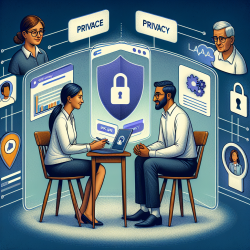Privacy is a crucial aspect of lifelogging technologies, which are often used in assistive applications for older adults and individuals with special needs. The concept of Privacy by Design (PbD) is highlighted in the research as a fundamental approach to developing and implementing these technologies. Here are some key takeaways from the research and practical steps you can take to integrate these findings into your practice:
Understanding Privacy by Design
Privacy by Design is an approach that embeds privacy into the development process of technology from the outset. This method ensures that privacy concerns are addressed proactively, rather than reactively. By incorporating PbD, you can help protect your clients' sensitive data and build trust in your services.
Key Strategies for Practitioners
Here are some practical strategies based on the research to help you implement privacy-aware lifelogging technologies in your online therapy practice:
- Conduct Privacy Impact Assessments (PIAs): Regularly evaluate the privacy risks associated with the technologies you use. This helps identify potential vulnerabilities and implement necessary safeguards.
- Use Privacy-Enhancing Technologies (PETs): Incorporate technologies that minimize data collection and enhance data security, such as encryption and anonymization techniques.
- Educate Clients: Inform your clients about how their data is being collected, used, and protected. Transparency builds trust and empowers clients to make informed decisions.
- Implement Data Protection by Default (DPbD): Ensure that your default settings prioritize privacy. For example, use the least amount of data necessary to achieve the intended purpose and regularly update your privacy settings.
- Collaborate with Interdisciplinary Teams: Work with experts from various fields, such as law, computer science, and rehabilitation, to develop comprehensive privacy strategies tailored to your practice.
Encouraging Further Research
While the research provides a strong foundation, it's essential to stay updated with ongoing developments in privacy-aware lifelogging technologies. Engage in continuous learning and consider participating in interdisciplinary research projects to further enhance your skills and knowledge.
By implementing these strategies, you can ensure that your online therapy services are not only effective but also respectful of your clients' privacy. This approach not only enhances the quality of care but also builds a trustworthy and ethical practice.
To read the original research paper, please follow this link: Interdisciplinary perspectives on privacy awareness in lifelogging technology development.










